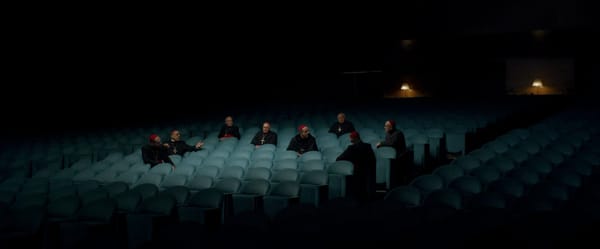The story beneath the story
Complicating meanings in Air Conditioner (2020)

When air conditioners in Angola’s capital city begin mysteriously falling from buildings, Matacedo sets off on a jazzy, magical realist journey that lays bare the turmoil of a country trying to recover from its colonial past.
Air Conditioner is a 2020 Afrofuturist film directed by Fradique. It follows the protagonist Matacedo as he weaves in and out of urban buildings, streets, and alleyways while on a futile mission to fix his boss’s air conditioner before it too succumbs to its fate.
On the surface, the film resists a Hollywood-style solution to its central mystery. It’s the kind of movie that might easily frustrate us because we’re forced to sit with the discomfort of uncertainty. But it’s that uncertainty that can nudge us to dig deeper into what might be beneath the story of the falling air conditioners.

The movie begins with three definitions:
air (n) gas that surrounds the earth; the gas that we breathe; breeze, wind; appearance, look; manner
condition (v) determine the outcome of something; place conditions to; to control
air conditioner (n) a machine that regulates the heating or cooling of a room, building, or vehicle
Like a book that starts with an epigraph or a prologue to a Shakespeare play, these definitions serve to capture the essence of the story. They can become, if you’d like, a lens through which to speculate about the movie’s narrative. By using these definitions to introduce itself, the film complicates the literal meaning of “air conditioner” and, subsequently, the message beneath its story.
To condition the air does not only have to refer to the regulation of the air’s temperature. It can also refer to the regulation and control of the air itself or, in other words, having power over the substance that necessitates human survival. In Air Conditioner, the characters are given no choice but to acclimatise to this invasive technology so when it unexpectedly malfunctions, they realise their bodies can no longer endure the heat on their own and that they don’t have the capacity to repair the machines they’ve come to rely on.
By exploring the multi-layered meanings of “air conditioning”, a postcolonial tale about the relentless consequences of colonialism begins to emerge. An air conditioner becomes a symbol of a foreign way of life thrust upon a native community and reveals the roots of the economic disparities and climate crises that persist across the African continent today.
If you’ve found value, joy, or comfort in The Kulturalist, consider clicking the button below to support my work. Your generosity keeps the words flowing. Thank you for being here!





